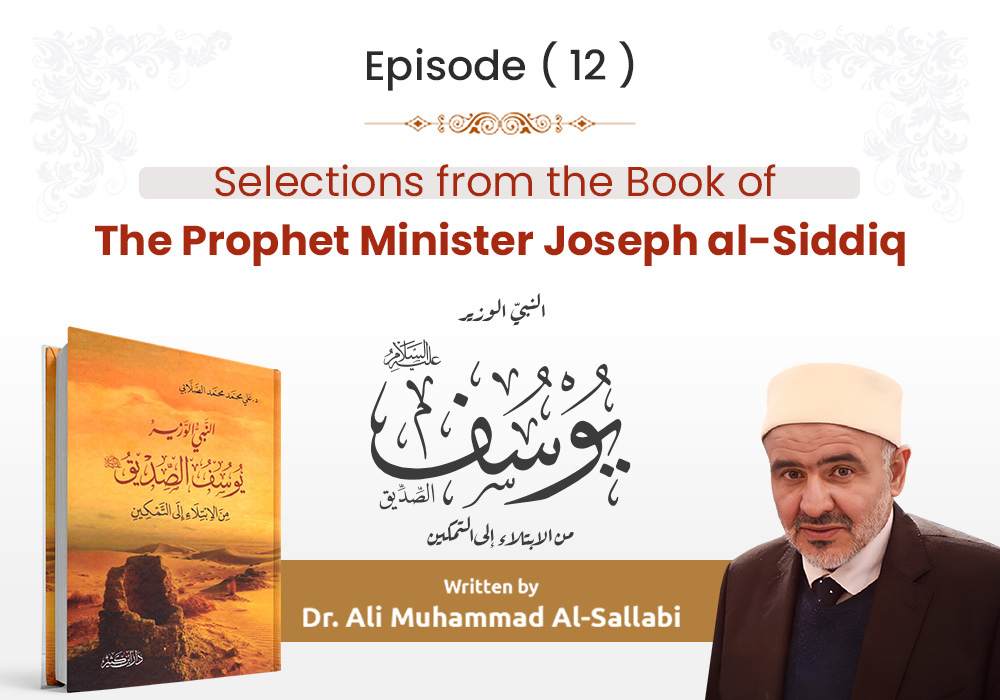Among the purposes of Surah Yusuf, peace be upon him
Selections from the Book The Prophet Minister Joseph al-Siddiq…
Written by Dr. Ali Muhammad al-Sallabi...
Episode (14)
1- Reflection, contemplation, and insight, as Allah, the Most High, said: {that you might understand} [Yusuf: 2]; meaning, so that you may understand the revelations and stories revealed by Allah, ponder over the consequences of matters, and not be content with the superficial aspects alone. Instead, delve into their essence, outcomes, and effects in both this world and the hereafter.
2- Creating comprehensive awareness and providing complete close and distant education so that the Muslim emerges from negligence and superficiality, becoming capable of understanding things and issues in their true essence and objectives.
3- Strengthening faith in Allah, complete reliance on Him, and entrusting all matters to Him: {The decision is only for Allah; upon Him I have relied, and upon Him let those who would rely [indeed] rely} [Yusuf: 2]. Thus, humans should take necessary actions while placing their trust in Allah, with true reliance on Him.
5- Drawing lessons and admonition for those with sound minds and conscious hearts, as Almighty Allah says: {There was certainly in their stories a lesson for those of understanding. Never was the Qur’an a narration invented, but a confirmation of what was before it and a detailed explanation of all things and guidance and mercy for a people who believe} [Yusuf: 111].
6- Showing that envy does not bring any good, even to its owner; rather, it leads to disappointment, humiliation, and disgrace. Allah may make the envy of the envier a cause for the elevation of the envied.
7- Calling for the oneness of Almighty Allah, rejecting polytheism, and emphasizing the adherence to the monotheistic path of Abraham, Isaac, and Jacob.
8- Advocating for the purification of the human soul by defining its nature, encouraging people to self-audit, and emphasizing turning to Allah through seeking forgiveness and repentance.
9- Indicating the path that leads to fear of Allah by highlighting and demonstrating its fruits in the life of Joseph, peace be upon him. It serves as a means of finding solutions in times of difficulty, easing matters with Allah's guidance, enlightening minds, purifying souls, and bringing about both material and spiritual blessings. Additionally, it provides protection against the schemes and plots of enemies.
10- Commending noble virtues and positive qualities such as sincerity, truthfulness, benevolence, chastity, generosity, forgiveness, patience, wisdom, knowledge, and more.
11- Emphasizing the importance of offering goodness and benevolence, assisting people in resolving their crises, and overcoming their hardships, regardless of their beliefs. This act of kindness and action is considered a means of drawing closer to the face of Almighty Allah.
12- Highlighting that empowerment for the servants of Allah is purely a favor from Allah, guided by His reasons, fulfilled by His conditions, following His traditions and characteristics, and subject to His will and power.
13- Emphasizing that strength and empowerment are means to draw closer to Allah in serving the poor, needy, and vulnerable, providing assistance to those in need, and maintaining family ties with relatives, and so on.
14- Highlighting that those who are with Allah will find Allah with them, and those who fall into sins and transgressions live in anxiety and sorrow. Additionally, the mercy of Allah is near to His worshipers, whether obedient or disobedient.
15- Emphasizing that the purpose of life is to achieve worship, cultivate the earth, and strive to fulfill the obligations of Islam. It also encourages individuals to join the righteous in pursuing these objectives and goals outlined in this great surah.
- Ali Muhammad al-Sallabi, The Prophet Minister Joseph al-Siddiq, pp. 65-68.
For further information and review of the sources for the article, see:
The Book of The Prophet Minister Joseph al-Siddiq on the official website of Sheikh Dr. Ali Muhammad al-Sallabi:






